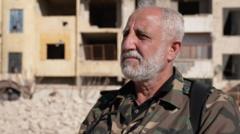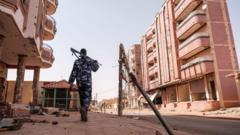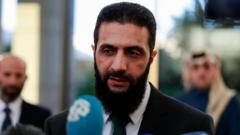Amidst widespread devastation from the civil war, a growing sentiment among Syrians expresses a desire for the withdrawal of Russian forces. While interim leaders discuss continued strategic partnerships, rebels and civilians maintain that Russia's involvement has harmed their homeland.
Syrians Seek New Beginnings Without Russian Influence

Syrians Seek New Beginnings Without Russian Influence
As Syria looks to rebuild after years of conflict, many citizens desire a future free from Russian military presence, despite the complexities involved in altering longstanding alliances.
Syrians are increasingly voicing a desire for a future devoid of Russian military presence, as their nation begins to contemplate rebuilding after years of civil war and political upheaval. Ahmed Taha, a rebel commander from Douma, exemplifies this sentiment, categorizing Russia as an enemy while acknowledging the complexities faced by Syria's interim leaders who deliberate on foreign relations.
Historically, Russia and Syria were allies, with Moscow gaining crucial access to Mediterranean military bases while providing military aid to Damascus against rebel forces. However, in the aftermath of Bashar al-Assad's regime, many Syrians yearn for the departure of Russian troops, despite reassurances from the interim government about potential continued cooperation.
"Russia's crimes here were indescribable," states Taha, exuding the resentment felt by numerous compatriots during an interview. Douma, which was once a thriving city, now lies in ruins, a reflection of the intense fighting that has gripped the region for nearly 14 years. The Russian military became engaged in the Syrian conflict in 2015, bolstering Assad's regime at a time when it appeared vulnerable to falling into rebel hands.
The Kremlin's intervention, interpreted as an extension of President Vladimir Putin's ambition to assert Russia's global influence following its annexation of Crimea, has led to accusations of war crimes. According to UN reports, Russian and Syrian forces were responsible for widespread death and destruction, with airstrikes targeting civilian areas and humanitarian resources during the siege on Eastern Aleppo.
As many rebel fighters and civilians now perceive Russia as complicit in the atrocities committed by the Assad regime, calls for a complete withdrawal of Russian forces grow louder. "For us, Russia is an enemy," declares Taha, an opinion echoed by various community members, including representatives of Syria’s Christian minorities who feel betrayed by Moscow’s claims of providing protection.
While interim leader Ahmed al-Sharaa emphasizes the ongoing strategic nature of Russian-Syrian relations in recent interviews, the future of Russian military bases in Syria continues to be a point of negotiation. Analysts suggest that rebuilding Syria's military may necessitate either a comprehensive re-evaluation of partnerships or a continued reliance on Russian resources, complicating efforts to disentangle long-standing dependencies formed over decades.
Historically, Syria has been heavily reliant on Russian armament dating back to the era of the Soviet Union, receiving extensive military supplies worth billions. As future dynamics unfold in a post-Assad landscape, the challenge of balancing sovereignty with historical ties to Russia presents a formidable task for Syria's new leaders. In this evolving narrative, many remain hopeful that a truly independent and prosperous Syria may still lie ahead, free from foreign military imposition.




















